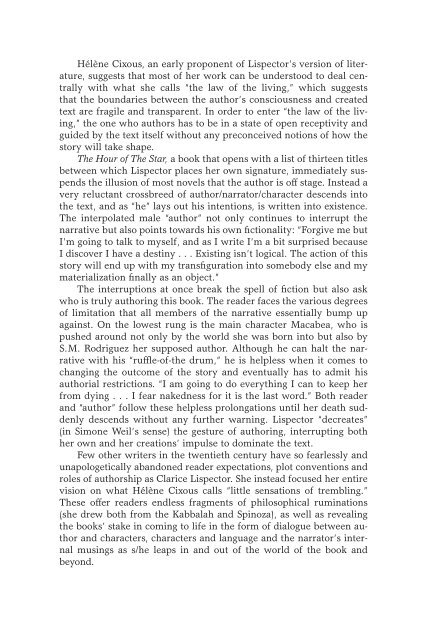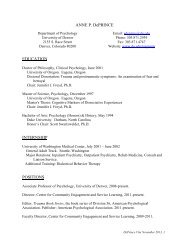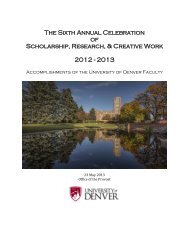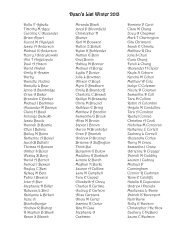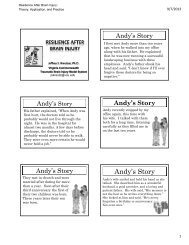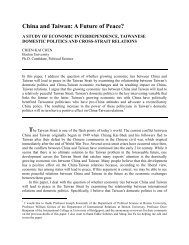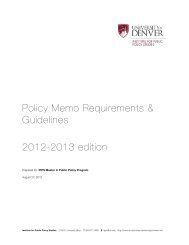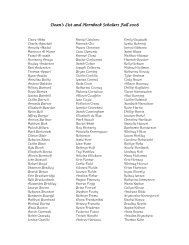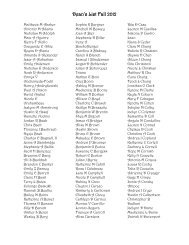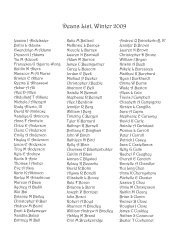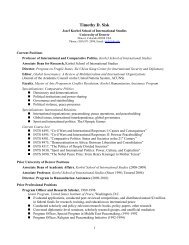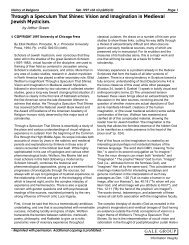The Law of the Living: On Clarice Lispector
The Law of the Living: On Clarice Lispector
The Law of the Living: On Clarice Lispector
Create successful ePaper yourself
Turn your PDF publications into a flip-book with our unique Google optimized e-Paper software.
Hélène Cixous, an early proponent <strong>of</strong> <strong>Lispector</strong>’s version <strong>of</strong> litera<br />
ture, suggests that most <strong>of</strong> her work can be understood to deal centrally<br />
with what she calls “<strong>the</strong> law <strong>of</strong> <strong>the</strong> living,” which suggests<br />
that <strong>the</strong> boundaries between <strong>the</strong> author’s consciousness and created<br />
text are fragile and transparent. In order to enter “<strong>the</strong> law <strong>of</strong> <strong>the</strong> living,”<br />
<strong>the</strong> one who authors has to be in a state <strong>of</strong> open receptivity and<br />
guided by <strong>the</strong> text itself without any preconceived notions <strong>of</strong> how <strong>the</strong><br />
story will take shape.<br />
<strong>The</strong> Hour <strong>of</strong> <strong>The</strong> Star, a book that opens with a list <strong>of</strong> thirteen titles<br />
between which <strong>Lispector</strong> places her own signature, immediately suspends<br />
<strong>the</strong> illusion <strong>of</strong> most novels that <strong>the</strong> author is <strong>of</strong>f stage. Instead a<br />
very reluctant crossbreed <strong>of</strong> author/narrator/character descends into<br />
<strong>the</strong> text, and as “he” lays out his intentions, is written into existence.<br />
<strong>The</strong> interpolated male “author” not only continues to interrupt <strong>the</strong><br />
narrative but also points towards his own fictionality: “Forgive me but<br />
I’m going to talk to myself, and as I write I’m a bit surprised because<br />
I discover I have a destiny . . . Existing isn’t logical. <strong>The</strong> action <strong>of</strong> this<br />
story will end up with my transfiguration into somebody else and my<br />
materialization finally as an object.”<br />
<strong>The</strong> interruptions at once break <strong>the</strong> spell <strong>of</strong> fiction but also ask<br />
who is truly authoring this book. <strong>The</strong> reader faces <strong>the</strong> various degrees<br />
<strong>of</strong> limitation that all members <strong>of</strong> <strong>the</strong> narrative essentially bump up<br />
against. <strong>On</strong> <strong>the</strong> lowest rung is <strong>the</strong> main character Macabea, who is<br />
pushed around not only by <strong>the</strong> world she was born into but also by<br />
S. M. Rodriguez her supposed author. Although he can halt <strong>the</strong> narrative<br />
with his “ruffle-<strong>of</strong>-<strong>the</strong> drum,” he is helpless when it comes to<br />
changing <strong>the</strong> outcome <strong>of</strong> <strong>the</strong> story and eventually has to admit his<br />
authorial restrictions. “I am going to do everything I can to keep her<br />
from dying . . . I fear nakedness for it is <strong>the</strong> last word.” Both reader<br />
and “author” follow <strong>the</strong>se helpless prolongations until her death suddenly<br />
descends without any fur<strong>the</strong>r warning. <strong>Lispector</strong> “decreates”<br />
(in Simone Weil’s sense) <strong>the</strong> gesture <strong>of</strong> authoring, interrupting both<br />
her own and her creations’ impulse to dominate <strong>the</strong> text.<br />
Few o<strong>the</strong>r writers in <strong>the</strong> twentieth century have so fearlessly and<br />
un apologetically abandoned reader expectations, plot conventions and<br />
roles <strong>of</strong> authorship as <strong>Clarice</strong> <strong>Lispector</strong>. She instead focused her entire<br />
vision on what Hélène Cixous calls “little sensations <strong>of</strong> trembling.”<br />
<strong>The</strong>se <strong>of</strong>fer readers endless fragments <strong>of</strong> philosophical ruminations<br />
(she drew both from <strong>the</strong> Kabbalah and Spinoza), as well as revealing<br />
<strong>the</strong> books’ stake in coming to life in <strong>the</strong> form <strong>of</strong> dialogue between author<br />
and characters, characters and language and <strong>the</strong> narrator’s internal<br />
musings as s/he leaps in and out <strong>of</strong> <strong>the</strong> world <strong>of</strong> <strong>the</strong> book and<br />
beyond.<br />
94


